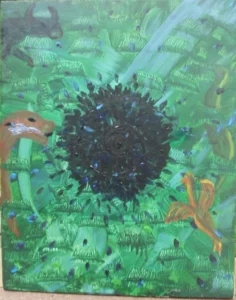It wasn’t my original plan to start off 2013 with an article about something as difficult as the killings in Newtown, CT. But perhaps it is good to start off the year with a resolution for true change.
Needless to say, the most obvious lesson we can take away from the sad events in Newtown is the need for much stricter gun controls. For the first time in many years, it’s looking like this might actually happen. But I think the problems run much deeper than gun control.
The next layer that we must ultimately confront is how we deal with mental illness in the United States. I am deeply familiar with this issue, since my own brother is schizophrenic. The truth is, most schizophrenics are not violent; in fact, quite the opposite. But that doesn’t mean they don’t need our help. Sadly, the mass de-institutionalization programs of the 1980s under Reagan landed too many of these tortured souls on the street. And even if they are not homeless, most are definitely not monitored and helped as much as they could and should be.
The way the laws are now structured in the USA, it is virtually impossible to get proper care for mentally ill individuals who really do need some form of institutional care. In order for them to be held against their will, one has to prove that they are a “threat to themself or others,” and that isn’t often easy or even possible to do. Not by a long shot. The result is that the burden falls on families, who ultimately have very little control over their loved one. And the family’s lives often become tortured too. The result is often inevitable — the street or social isolation.
Why don’t we help our mentally ill citizens properly? Because it costs money. For example, in New York State, where my brother lives, if you do manage to get your loved one held for observation beyond an initial “observation period” of a few days (very difficult!), and if that person wants to stay under institutional care, the state ultimately has to foot the bill once the person’s funds run out. That’s something the government really doesn’t want to do. But it is something that does need to be done, and not just for those who are obviously dangerous to themselves or others.
As I write this, it is emerging that Adam Lanza’s mother was well aware that her son needed help and even some form of institutionalization. There should have been some societal mechanism, including counseling, that would have enabled her to help her son in a way that was safe for herself and for others.
But even our handling of the mentally ill is not the whole story. The sad truth is that more and more children may be growing up to be like Adam Lanza. One brave mother from Boise, Idaho shared a story about her own son, which appeared in my own San Francisco newspaper. Entitled “I Am Adam Lanza’s Mother”, Liza Long describes the violent rages of her now 13-year-old son and the need to lock her other children in the car to protect them.
Of course, it doesn’t help matters when kids these days (especially boys) are spending countless hours playing horribly realistic war-based video games. My husband and I did not allow these kinds of games in our own home, but I’ve seen how other children spend many hours each day playing them. Blend the violence of our society and entertainment with a whole generation of children, many of whom have become brain-damaged by — you guessed it — over-vaccination, and the results can be disastrous.
This is the lesson that almost no one is going to talk about or address: that one of the deep reasons for all these mass-shootings may be the American vaccination program. In a recent email sent out to his mailing list, chiropractor Tedd Koren points out that medical historian Harris Coulter predicted the current wave of violence we are now seeing in his eerily prescient 1990 book Vaccination, Social Violence, and Criminality. As Koren writes:
“The mechanism that [Coulter] discussed was brain damage known to be caused by vaccination: sub-acute encephalo-meningitis. This condition was known to cause inflammation of the base of the brain and to affect personality and behavior.
“Dr. Coulter, one of America’s premiere medical historians, did extensive research to show that encephalitis was an acknowledged medical reaction to nearly all vaccinations. A very mild form of this could cause serious personality distortions and disorders. A review of the ‘epidemics’ of infectious encephalitis which swept America and Europe in the 1920s reveals that those who survived such a condition would suffer from various conditions which we recognize today but were exceedingly rare at that time.
“These conditions include ADD, ADHD, autism, Asperger’s syndrome, allergies, anorexia, bulimia, impulsive violence, stuttering, mental retardation, dyslexia, sudden infant death syndrome (Crib death), processing disorders, the inability to feel empathy, bed-wetting, Tourette’s, seizures, … and many others. These conditions, it must be repeated, seemed to come out of nowhere (or rarely occurred) in those times.
“Coulter seemed especially concerned about the violence emanating from such diseased brains. His evaluation of prisoners revealed that a surprisingly high number suffered from various neurological disorders such as tics, stuttering, dyslexia and other conditions which were reflective of nervous system problems.”
Of course, most people with these problems are not violent. But, as pointed out in the newspaper article I cited, the only solution conventional medicine seems to offer for children who do suffer from rage are the same suppressive drugs used for schizophrenics like my brother. Besides having serious side-effects, these drugs often don’t work forever.
A better answer, of course, is homeopathy. It’s a time-tested way to correct vaccine damage. It also provides an alternative to vaccines as a way of dealing with childhood illnesses and the flu. The writings of homeopaths like the Reichenberg-Ullmans, in their book Rage Free Kids, add testimony to homeopathy’s ability to help children who have problems with rage and anger.
I often wonder what my brother’s life would have been like if my family knew about homeopathy when he started having problems at age 10. And who knows what might have happened if Adam Lanza’s mom sought out homeopathic treatment for her son when he first started having problems? I’m afraid we will never know. I just hope that our society can begin to learn all the lessons it can from this horrible tragedy, even the very uncomfortable or unpopular ones.



